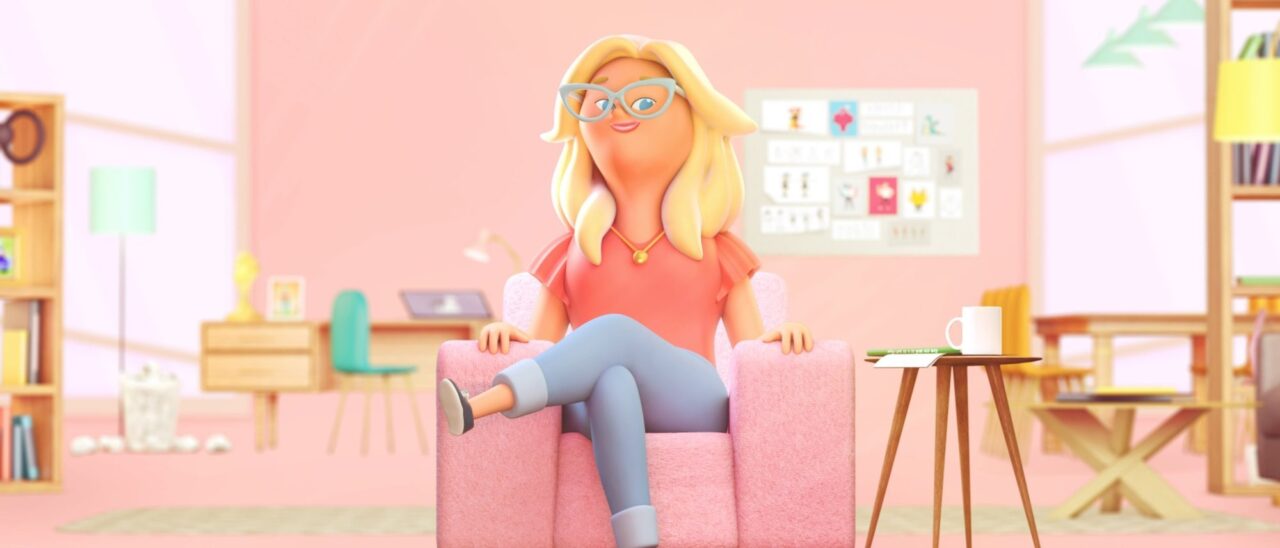Note: This post contains affiliate links. If you use these links to buy something, I may earn a commission. Thanks.
First up in my MasterClass series is Nancy Cartwright Teaches Voice Acting. For nearly 40 years she has voiced some of the most iconic animated characters, including Bart Simpson, Rufus from Kim Possible, Chuckie from Rugrats, and more. She teaches you how to use voice acting to bring animated characters to life… but I learned so much more about sparking new life into myself and my clients.
How to Use Your Voice
I went into this class thinking it would be about the technical aspects of voice acting and starting a career, but it taught me so much more about using my voice. It is a tool that I use all the time, but rarely think about. I have a voice. YOU have a voice. It is a powerful tool that can help us get what we truly want out of life. You can use it to tell stories, bring about change in your community, bring joy into your life and other’s lives through song, poetry, and storytelling. We use it to get what we want by asking for promotions, raises, and respect at work. We use it to communicate our needs, emotions, and love for others.
We rarely stop and think about how we’re going to change our tone and words to accurately reflect what we’re thinking and feeling, and just do it when we talk to others. Our voices change depending on who we’re talking to and what we’re saying. To create the iconic voice for Bart Simpson, a 10 year-old underachieving boy with a big attitude, Nancy Cartwright didn’t completely change her voice. She used her existing voice and tweaked it slightly and added layers to enhance what was already there.
Thinking about your voice as a tool, how can you use it to achieve your goals and get what you truly want out of life? What other tools already exist in your life that you can tweak and make slight
adjustments to that will lead to a great sense of fulfillment? For example, many people use food as a coping tool to escape their emotional pain. What if we continue to use food as a tool, but slightly change our perspective of how we use it? Rather than using it as a way to escape our emotions, we can use it as a reward for overcoming our problems. Instead of feeling disappointed and defeated for not getting something done and eating an entire pint of ice cream in front of the TV (escapism), remind yourself that the ice cream in your freezer is a good thing. You can either enjoy it for the sake of eating something pleasant, or use it as a tool to motivate you. Earn that ice cream – finish what you set out to do, whatever your true commitment and goals are, and reward yourself as a celebration of your triumphs. We can look at food as a celebration. A celebration of what we have accomplished (it doesn’t have to be anything major), and a celebration of the senses – what do you taste, smell, and feel when you eat? The act of eating something you like is a celebration and can be used to celebrate successes and achievements that align with your true goals. Just like your voice, it is a tool that can bring enjoyment to yourself and others depending on how you use it.
Using “Voice” as a Tool in Therapy
While taking Nancy Cartwright’s MasterClass, I reflected on how I could use “voice” as a tool in therapy. A client comes in (or meets virtually), and we use our voices to communicate with one another. Every day I listen to what my clients are saying and how they say it. I realized that almost everyone voice acts at one point or another when they tell a story, and not just in therapy. Think about the last time you told a story about someone you know – your wife, husband, partner, boss, parent, etc. Did you change your vocal tone, speak faster or slower, go higher or lower pitched, or use different words than you normally would? That is voice acting. We all do it to reflect a real character and to tell a better story. I have not met a single person who doesn’t voice-act, even if they don’t realize that’s what they’re doing or call it that.

Everyone does it, but when asked to do it on command, most people will freeze up. Voice-acting, doing silly voices, and public speaking is a common cause for anxiety. Being asked to do it on the spot or in front of strangers triggers anxiety, nervousness, and freezing up. This MasterClass made me realize that it is a perfect tool to help clients recognize the symptoms of anxiety.
In therapy, I ask clients who are struggling with anxiety to do a silly voice. It usually triggers the same feelings of anxiety that they face outside of the therapy session. Voice acting is silly, but still causes the same reaction. In a safe space, clients can learn to recognize the symptoms and sensations of anxiety. What are you physically feeling? Hot, shallow breathing, sweating, figgety… When you become aware of what your anxiety feels like, you can recognize it in its early stages as it’s creeping in before it becomes too much to handle.
Then we work on building up a tolerance. Asking my clients to do silly voices teaches them to become comfortable with the uncomfortable. Anxiety is like spicy food – a little is ok, but a lot can be too much to handle. You don’t avoid spice all together, just like you don’t avoid every single thing that can cause a little bit of anxiety. Building up a tolerance for anxiety is like building up a tolerance for spice. A little spice makes your tongue tingle. “I can’t handle that.” A lot of spice makes your whole mouth burn and you sweat profusely. “That’s too much for me.” What circumstances and situations trigger anxiety and you can handle? And just like spice (such as drinking milk when things get too hot), therapy teaches you the tools to soothe anxiety.
Although voice acting is silly, it still triggers anxiety. So let’s do it in a safe space, in therapy, where you can learn how to cope and separate out what you can handle and overcome, and what tolerance still needs to be built up.
Rejection is Inevitable!
Another big life lesson that this MasterClass teaches it that rejection is inevitable! We all get rejected at some point in our lives, from job interviews, to friendships, to relationships. Rejection has nothing to do with what you’re doing or who you are, but is the result of two things or people not fitting just right, someone else being a better fit for whatever the role is, bad timing, or perhaps it was the wrong approach. Nancy Cartwright, who is at the top of her field, still faces rejection in auditions.
So how does Nancy handle rejection? She let’s it go, walks away, and focuses on the now and the future. While that’s always easier said than done, it’s important to acknowledge the sense of loss. Loss of what isn’t and won’t be. Once you’ve made peace with that loss, focus on your goal and what you’re going to do to accomplish that goal. For Nancy, she focuses on what she does have and the next opportunity. Therapy teaches the same thing through mindfulness and being present.
Having Fun through Voice Acting
To animate means to GIVE LIFE. We often look at animation as children’s movies not meant for adults. We grow up and grow out of playing, dreaming, and having fun. But voice acting is an entire profession of successful people whose job it is to play. It’s a job, but it’s silly, fun, and fulfilling. As I discussed in my introductory blog post about this MasterClass series, hobbies and having fun for the sake of having fun are extremely underestimated as a source of fulfillment in our lives. There are aspects of our youth that teach us how to live a better way of life. Voice acting is a profession, but it’s silly and fun, something that many of us don’t make time for anymore.
When was the last time you tried a new hobby or activity that wasn’t related to your profession or career? I invite you to join me on this journey of self-discovery, education, and fun through MasterClass.


